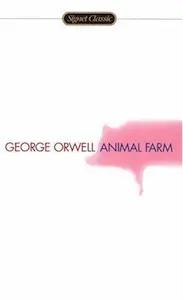Animal Farm - Summary
George Orwell

Introduction
George Orwell’s “Animal Farm” is a captivating allegorical novel that serves as a powerful critique of the Russian Revolution and the corrupting nature of power. Published in 1945, the book tells the story of a group of farm animals who overthrow their human farmer in pursuit of a utopian society. However, as the pigs, led by Napoleon, take control, the ideals of equality and justice quickly fade away, revealing the dark realities of totalitarianism. Through vivid characters and compelling anecdotes, Orwell masterfully depicts the dangers of political manipulation and the importance of remaining vigilant in the face of tyranny.
The Rise of Rebellion
The story begins on Manor Farm, where the animals are subjected to the oppressive rule of Mr. Jones, the neglectful and abusive farmer. Old Major, a wise and respected boar, gathers the animals and shares his vision of a world free from human exploitation. He teaches them the revolutionary song “Beasts of England,” which becomes a symbol of hope and unity throughout the book. After Old Major’s death, the animals, led by the pigs Snowball and Napoleon, rise up against their human oppressors in a successful rebellion.
The Promise of Equality
With the humans expelled from the farm, the animals establish a set of commandments known as the Seven Commandments, which embody the principles of Animalism. These commandments promote equality, such as “All animals are equal” and “No animal shall kill another animal.” The animals work together to maintain the farm and establish a new order where everyone is equal and free.
The Manipulative Tactics of Napoleon
However, as time passes, the pigs, led by Napoleon, gradually seize power and manipulate the other animals to serve their own interests. Napoleon, a cunning and ruthless leader, uses propaganda, fear, and violence to maintain control. He gradually alters the commandments to suit his needs, such as changing “No animal shall sleep in a bed” to “No animal shall sleep in a bed with sheets.” Through these changes, Orwell highlights the gradual erosion of the animals’ rights and the corruption of the original ideals.
The Exploitation of Boxer
One of the most poignant examples of the pigs’ manipulation is their treatment of Boxer, a loyal and hardworking horse. Boxer represents the dedicated working class who blindly follow their leaders. Despite his immense strength and devotion to the cause, Boxer is eventually sold to a glue factory by the pigs, who value their own comfort and luxury over the well-being of their comrades. This heart-wrenching betrayal serves as a stark reminder of how power can corrupt even the most well-intentioned individuals.
The Role of Squealer
Squealer, Napoleon’s persuasive and manipulative propagandist, plays a crucial role in maintaining the pigs’ control over the other animals. Through his eloquent speeches and clever use of language, Squealer justifies the pigs’ actions and convinces the animals that they are better off under their rule. For instance, when the pigs start consuming alcohol, which was initially forbidden, Squealer argues that it is necessary for their brainwork. Orwell uses Squealer to illustrate the power of propaganda in shaping public opinion and justifying unjust actions.
The Tragic Fate of Benjamin
Benjamin, a cynical and intelligent donkey, serves as a symbol of the disillusioned masses who see through the pigs’ lies but feel powerless to change the situation. Despite his awareness of the pigs’ corruption, Benjamin remains passive and refuses to take action. This passivity ultimately leads to his tragic fate, as he witnesses the deterioration of the farm and the betrayal of his fellow animals. Benjamin’s character serves as a cautionary tale, highlighting the dangers of apathy and the importance of active resistance against tyranny.
The Final Transformation
By the end of the novel, the pigs have fully transformed into the humans they once despised. They walk on two legs, wear clothes, and even adopt human vices. The famous commandment “All animals are equal” is replaced by the chilling slogan “All animals are equal, but some animals are more equal than others.” This final transformation underscores the novel’s central message: power corrupts, and absolute power corrupts absolutely.
Conclusion
In “Animal Farm,” George Orwell masterfully crafts a compelling allegory that exposes the dangers of totalitarianism and the manipulation of power. Through the use of vivid characters and thought-provoking anecdotes, Orwell highlights the gradual erosion of equality and justice in the pursuit of power. The novel serves as a timeless reminder of the importance of remaining vigilant and active in the face of tyranny, as well as the need to question authority and uphold the principles of equality and justice. “Animal Farm” stands as a powerful testament to the enduring relevance of Orwell’s work and the importance of safeguarding democratic values.